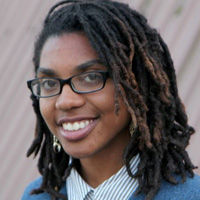Every day I check my Gmail, chat with friends on Facebook and tell my Macbook Pro how much I love it. But when I graduate from college next year, I'm not sure how much these companies will love me, and by love me I mean hire me.
Less than 1 percent of startups funded last year were founded by African-Americans. This year as a part of Youth Radio's App Lab, I visited the headquarters of one of the world's biggest tech giants four times and was never introduced to a single black engineer or executive. Maybe they were in a different building or all at a meeting?
That experience reminded me of visits to my father's office in the '90s. He worked at Intel for 10 years, and I could count the number of his African-American colleagues on my little hands.
The tech industry argues that there's a pipeline problem. In other words, not enough African-Americans are entering the industry. And there's some truth to that. Until recently tech was considered Steve Urkel nerdy, not Steve Jobs cool. Plus where are black kids going to gain exposure to programming? For example, in Oakland only two of 20 public high schools offer classes in computer programming.
Silicon Valley often identifies as a place where people advance based on their ideas and achievements, but what gets glossed over is that it's only a meritocracy if you're in the club.
